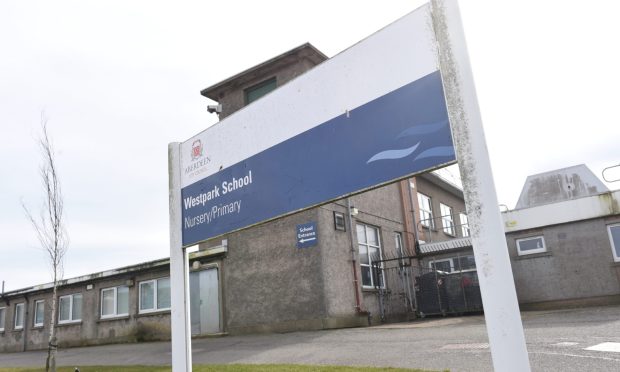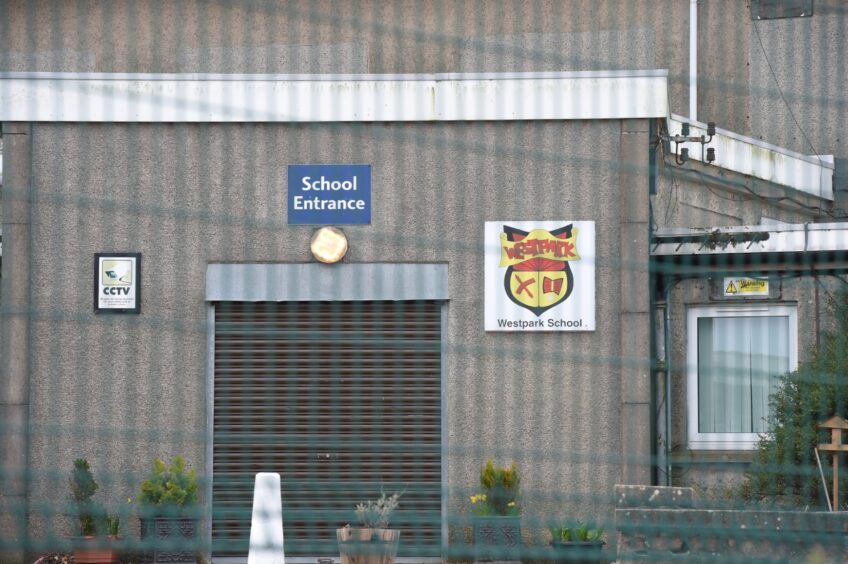An Aberdeen primary school has been told to make improvements after being rated as ‘weak’ in a damning inspection.
Westpark School, in Northfield, was visited by Education Scotland inspectors in December 2023.
A new report has now revealed the school and adjoining nursery have been ordered to make improvements ahead of a follow-up inspection.
Westpark is one of six local schools facing closure in the Northfield area of the city.
The school was evaluated as weak for learning, teaching and assessment and raising attainment and achievement.
The nursery was evaluated as weak for learning, teaching and assessment and securing children’s progress.
Westpark Primary School inspection
The report acknowledges that there have been “a number of recent staffing changes” at the school, with headteacher Gregod Watson supported by a depute who steps into his role one day per week.
Learning, teaching and assessment – key points
Learning, teaching and assessment was rated as weak.
- Staff were praised for developing positive relationships with children, and for exhibiting school values of belonging and kindness
- Staff were urged to continue to “engage in professional learning, further exploring the role of the adult in supporting learning though play”
- Most lessons were “overly teacher-led”, which frequently led to children becoming “distracted and disengaged”
- Most lessons were “not planned at the right level of difficulty to provide all children with appropriate levels of pace and challenge” – with work often pitched to low or repetitive
- Pupils were “often not clear about the knowledge and skills they are developing” which led them to being unclear about learning. Teachers need to make sure children are clearer on what they are learning and why
- Teachers need to use “more skilled questioning techniques to promote children’s curiosity” as they don’t use open-ended questions
- Teachers need to develop “high-quality verbal and written feedback”
- There is a lack of consistency in how assessments are used across the school to measure progress
- Lesson planning needs to “take greater account of the different levels of challenge required to meet all children’s needs effectively” and staff should plan more clearly for different groups within each class
Raising attainment and achievement – key points
Raising attainment and achievement was rated as weak.
- Across the school, attainment in literacy and numeracy was weak, with most children capable of making more progress
- Assessment data isn’t reliable or accurate as there is a lack of consistency in how children are assessed across the school
- A minority of children are making satisfactory progress in literacy and English – most are capable of making better progress
- Most children listen well during classroom activities, with a minority becoming disengaged. A few children lack confidence in speaking up
- At first and second level, a minority of children “would benefit from reading more challenging texts”
- Across the school children would “benefit from teachers placing an increased focus on presentation and handwriting”
- A minority of children were making satisfactory progress in numeracy and mathematics, with the majority capable of making better progress
- Across all stages, children “need to experience further breadth and progression of number, money and measure and their processes”. They also need more opportunities to use numbers and record their learning
- Children need to develop further their knowledge of angles and across all stages need further opportunities to “consolidate their learning in shape, position and movement”
- Children need more opportunities to develop skills and knowledge of information handling, plus greater experience in how data can be recorded
- Staff need to use assessment information more effectively to “accelerate” children’s progress as they were unable to monitor progress of pupils with English as an additional language, care-experienced children and those who experience barriers to learning
- Children participate well in a wide range of after-school clubs
- A minority of children have leadership opportunities and staff should think about how they can take on more of these roles
- There is “little evidence of accelerating progress in closing the poverty-related attainment gap” and staff need to identify if interventions are helping children most affected by poverty as best they can
- Attendance is 2% below national average
Westpark Nursery inspection
Learning, teaching and assessment – key points
Learning, teaching and assessment was rated as weak.
- Children experience “warn and nurturing relationships with practitioners”
- Children would benefit from “planned learning that extends and develops levels of engagement further”
- Practitioners need to use more open-ended questions to “extend and deepen” learning
- Senior leaders need to “improve the availability of digital resources” to increase digital skills more effectively
- Practitioners observe children playing and upload photos to a secure platform for parents and carers, but need to ensure observations are linked to the Curriculum for Excellence. The quality of observations is not consistent and needs to be tracked more effectively
- Children aren’t clear about the skills they are developing through play
- Practitioners need to “develop a shared understanding of national standards” of observations
- Practitioners should improve how they measure children’s progress and to do this need continued support from senior leaders
Securing children’s progress – key points
Securing children’s progress was rated as weak.
- Children were not making expected progress in early language, numeracy and mathematics
- Senior leaders and practitioners need to use targeted intervention data more consistently to identify targets and support for individual children
- The majority of children communicate effectively
- Most children need more opportunities to “regularly write for a purpose”
- Most children would “benefit from opportunities to develop their skills in information handling”
- Most children are making “satisfactory progress” in health and wellbeing
- Senior leaders need to create an overview of children’s achievements to ensure “no child is at risk of missing out”
- Practitioners are aware of children and families’ individual circumstances and know the community well, including barriers to learning
- Most parents feel comfortable approaching practitioners with concerns
- Senior leaders and practitioners “need to develop further how work to close the poverty related attainment gap is measured”
Why is Westpark earmarked for closure?
Westpark is one of six schools in the Northfield Academy catchment being considered for closure.
The other schools at threat are Bramble Brae, Heathryburn, Manor Park, Muirfield and Quarryhill.
The council says this is due to falling pupil numbers, which is leaving a “significant amount of unused space” in primary school buildings.Aberdeen City Council has been approached for comment.
The schools were part of a feasibility study, but a formal consultation has yet to take place.
Northfield Academy was also rated weak in several areas by Education Scotland inspectors last year, with “insufficient progress” made at a follow-up inspection last December.
Aberdeen City Council has been approached for comment.



Conversation